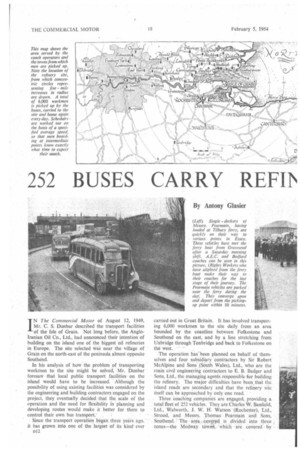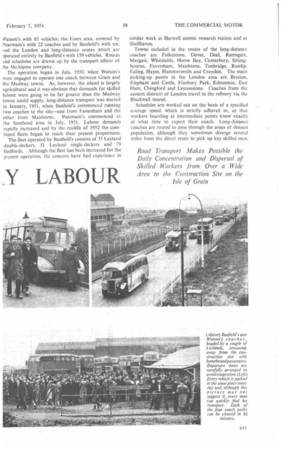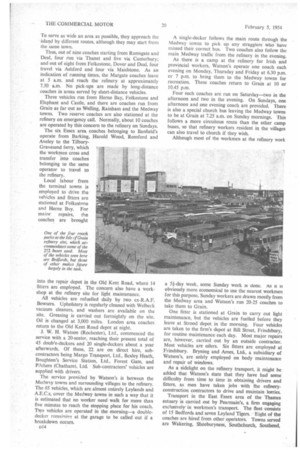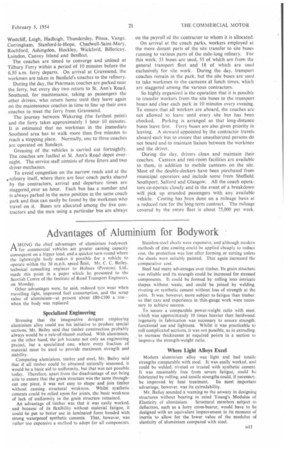252 BUSES CARRY REFEN Y LABOUR
Page 52

Page 53

Page 54

Page 55

If you've noticed an error in this article please click here to report it so we can fix it.
Road Transport Makes Possible the Daily Concentration and Dispersal of Skilled Workers from Over a Wide Area to the Construction Site on the Isle of Grain By Antony Glasier
IN The Commercial Motor of August 12, 1949, Mr. C. S. Dunbar described the transport facilities of the Isle of Grain. Not long beforc, the AngloIranian Oil Co., Ltd., had announced their intention of building on the island one of the biggest oil refineries in Europe. The site selected was near the village of Grain on the north-east of the peninsula almost opposite Southend.
In his analysis of how the problem of transporting workmen to the site might be solved, Mr. Dunbar foresaw that local public transport facilities on the island would have to be increased. Although the possibility of using existing facilities was considered by the engineering and building contractors engaged on the project, they eventually decided that the scale of the operation and the need for flexibility in planning and developing routes would make it better for them to
control their own bus transport.: Since the transport operation began three yea:rs ago. it has grown into one of the largest of its kind. ever
carried out in Great Britain. It has involved transporting 6,000 workmen to the site daily from an area bounded by the coastline between Folkestone and Southend on the east, and by a line stretching from Uxbridge through Tonbridge and back to Folkestone on the West.
The operation has`been planned on behalf of themselves and four subsidiary contractors by Sir Robert McAlpine and Sons ,(South Wales), Ltd., who are the main civil engineering contractors to E. B. Badger and Sons, Ltd., the managing agents responsible for building. the refinery. The major .difficulties have been that the island roads are secondary and that the refinery site itself can be approached by only one road.
Three coaching companies are engaged, providing a total fleet of 252 vehicles. They are Charles W. Bonfield, Ltd., Walworth, J. W. H. Watson (Rochester), Ltd., Strood, and Messrs, Thomas Pearmain and Sons, Southend. • The area -coyer.ecl_ is divided into three zones—the Medway: town's',• which are covered.'• by
Watson's with 65 vehicles; the Essex area, covered by Rearmain's with 22 coaches and by Banfield's with six; tnd the London and long-distance routes which arc werated entirely by Banfield's with 159 vehicles. Routes tnd schedules are drawn up by the transport officer of the McAlpine company.
The operation began in July, 1950, when Watson's were engaged to operate one coach between Grain and the Medway towns. As, however, the island is largely agricultural and it was obvious that demands for skilled labour were going to be far greater than the Medway towns could supply, long-distance transport was started in January, 1951, when Banfield's commenced running two coaches to the site—one from Faversham and the other from Maidstone. Pearmain*s commenced in the Southend area in July, 1951. Labour demands rapidly increased and by the middle of 1952 the combined fleets began to reach their present proportions.
The fleet operated by Banfleld's consists of 35 Leyland double-deckers, 51 Leyland single-deckers and 79 Iledfords. Although the fleet has been increased for the present operation, the concern have had experience in similar work at Harwell atomic research station and at Shellhaven.
Towns included in the routes of the long-distance coaches are Folkestone, Dover, Deal, Ramsgate, Margate, Whitstable, Herne Bay, Canterbury, Sittingbourne, Faversham, Maidstone, Tonbridge, Ruislip. Ealing, Hayes, Hammersmith and Croydon. The main picking-up points in the London area are Brixton, Elephant and Castle, Finsbury Park, Edmonton, East Ham, Chingford and Leytonstone. Coaches from the eastern districts of London travel to the refinery via the 131ackwall tunnel.
Schedules are worked out on the basis of a specified average speed, which is strictly adhered to, so that workers boarding at intermediate points know exactly at what time to expect their coach. Long-distance coaches are routed to pass through the areas of densest population, although they sometimes diverge several miles from the direct route to pick up key skilled men. To serve as wide an area as possible, they approach the island by different routes, although they may start from the same town.
Thus, out of nine coaches starting from Ramsgate and Deal, four run via Thanet and five via Canterbury; and out of eight from Folkestone, Dover and Deal, four travel via Ashford and four via Maidstone. As an indication of running times, the Margate coaches leave at 5 a.m. and reach the refinery at approximately 7.30 a.m. No pick-ups are made by long-distance coaches in areas served by short-distance vehicles.
Three vehicles run from Herne Bay, Folkestone and Elephant and Castle, and there are coaches run from Grain as far out as Welling, Rainham and the Medway towns. Two reserve coaches are also stationed at the refinery on emergency call. Normally, about 10 coaches are operated by this concern to the refinery on Sundays.
The six Essex area coaches belonging to Banfield's operate from Barking, Harold Wood, Romford and Aveley to the TilburyGravesend ferry, which the workmen cross and transfer into coaches belonging to the same operator to travel to the refinery.
Local labour from the terminal towns is employed to drive the vehicles and fitters are stationed at Folkestone and Herne Bay. For major repairs, the coaches are brought into the repair depot in the Old Kent Road, where 14 fitters are employed. The concern also have a workshop at the refinery site for light maintenance.
All vehicles are refuelled daily by two ex-R.A.F. Dowsers. Upholstery is regularly cleaned with Welbeck vacuum cleaners, and washers are available on the site. Greasing is carried out fortnightly on the site. Oil is changed at 3,000 miles. London area coaches return to the Old Kent Road depot at night.
J. W. H. Watson (Rochester), Ltd., commenced the service with a 20-seater, reaching their present total of 45 doubie-deckers. and 20 single-deckers about a year afterwards. Of these, 22 are on direct hire, subcontractors being Margo Transport, Ltd., Bexley Heath, Boughton's Service Station, Ltd., Forest Gate, and Pilchers (Chatham), Ltd. Sub-contractors' vehicles are supplied with drivers.
The service provided by Watson's is between the Medway towns and surrounding villages to the refinery. The 65 vehicles, which are almost entirely Leylands and A.E.C.s, cover the Medway towns in such a way that it is estimated that no worker need walk for more than five minutes to reach the stopping place for his coach. Two vehicles are operated in the morning—a doubledecker remaining' at the garage to be called out if a breakdown occurs. A single-decker follows the main route through the Medway towns to pick up any stragglers who 'have missed their correct bus. Two coaches also follow the main Medway traffic from the refinery in the evening.
As there is a camp at the refinery for Irish and provincial workers, Watson's operate one coach each evening on Monday, Thursday and Friday at 6.30 p.m. or 7 p.m. to .bring them to the Medway towns for recrea,tion. These coaches return to Grain at 10 or 10.45 p.m.
Four such coaches arc run on Saturday—two in the afternoon and two in the evening. On Sundays, one afternoon and one evening coach are provided. There is also a special church bus leaving the Medway towns to be at Grain at 7.25 a.m. on Sunday mornings. This follows a more circuitous route than the other camp buses, so that refinery workers resident in the villages can also travel to church if they wish.
Although most of the workmen at the refinery work a 5i-day week, some Sunday work is done. As it is obviously more economical to use the nearest workmen for this purpose, Sunday workers are drawn mostly from the Medway area and Watson's run 20-25 coaches to take them to Grain.
One fitter is stationed at Grain to carry out light maintenance, but the vehicles are fuelled before they leave at Strood depot in the morning. Four vehicles are taken to the firm's depot at Bill Street, Frindsbury, for routine maintenance each day. Most major repairs are, however, carried out by an outside contractor. Most vehicles are oilers. Six fitters are employed at Frindsbury. Bryning and Ames, Ltd.., a subsidiary of Watson's, are solely employed on body maintenance and repair of windows.
As a sidelight on the refinery transport, it might be added that Watson's state that they have had some difficulty from time to time in obtaining drivers and fitters, as men have taken jobs with the refineryconstruction contractors to drive and maintain lorries.
Transport in the East Essex area of the Thames estuary is carried out by Pearmain's, a firm engaging exclusively in workmen's transport. The fleet consists of 15 Bedfords and seven Leyland Tigers. Eight of the coaches are hired from other operators. Towns served are Wakering, ShOeburyness, Southchurch, Southend, Westcliff, Leigh, Hadleigh, Thundersley, Pitsea, Vange, Corringham, Stanford-le-Hope, Chadwell-Saint-Mary, Rochford, Ashingdon, Hockley, Wickford, Billericay, Laindon, Canvey Island and Benffeet.
The coaches are timed to converge and unload at Tilbury Ferry within a period of 10 minutes before the 6.30 a.m. ferry departs. On arrival at Gravesend, the workmen are taken in Banfield's coaches to the refinery.
During the day, the Pearmain coaches are parked near the ferry, but every day two return to St. Ann's Road, Southend, for maintenance, taking as passengers the other drivers, who return home until they leave again on the maintenance coaches in time to line up their own coaches to meet the ferry from Gravesend.
The journey between Wakering (the farthest point) and the ferry takes approximately 1 hour 10 minutes. It is estimated that no workman in the immediate Southend area has to walk more than five minutes to reach a stopping place. Normally, one to three coaches are operated on Sundays.
Greasing of the vehicles is carried out fortnightly. The coaches are fuelled at St. Ann's Road depot overnight. The service staff consists of three fitters and two driver-mechanics.
To avoid congestion on the narrow roads and at the , refinery itself, where there are four coach parks shared by the contractors, arrival and departure times are staggered.over an hour. Each bus has a number and is always parked in the same position in the same coach . park and thus can easily be found by the workmen who travel on it. Buses are allocated among the five contractors and the men using a particular bus are always on the payroll of the contractor to whom it is allocated.
On arrival at the coach parks, workers employed at the more distant parts of the site transfer to site buses running to various parts of the mile-long refinery. For this work, 53 buses are used, 35 of which are from the general transport fleet and 18 of which are used exclusively for site work. During the day, transport coaches remain in the park, but the site buses are used to take workmen to the canteens at tunch times, which are staggered among the various contractors.
So highly organized is the operation that it is possible to transfer workers from the site buses to the transport buses and clear each park in 10 minutes every evening. To ensure that all workers are aboard, the coaches arc not allowed to leave until every site bus has been checked. Parking is arranged so that long-distance buses leave first. Ferry buses are also given priority in leaving. A steward appointed by the contractor travels aboard each bus to ensure that unauthorized persons do not board and to maintain liaison between the workmen and the driver.
During the day, drivers clean and maintain their coaches. Canteen and rest-room facilities are available to them, in addition to mobile canteens on the site. Most of the double-deckers have been purchased from municipal operators and include some from Sheffield, Southport, Salford and Glasgow. All the coach operators co-operate closely and in the event of a breakdown will pick up stranded passengers with any available vehicle. Costing has been done on a mileage basis at a reduced rate for the long-term contract. The mileage covered by the entire fleet is about 75,000 per week.








































































































